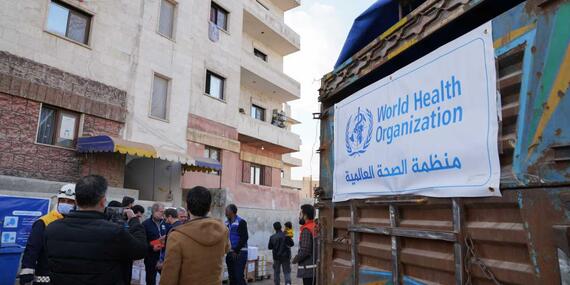Today's top news: Syria, Türkiye, Tropical Cyclone Freddy, DRC

Syria
A UN humanitarian mission took place today in northwest Syria to Idleb governorate. Representatives from OCHA, the International Organization for Migration, the UN Population Fund, the World Health Organization (WHO), Un Children’s Fund (UNICEF), the UN Refugee Agency (UNHCR) and our security colleagues visited a displacement camp and a reception center in Harim, Salqin and Ma’arrat Misrin. Medical supplies from WHO were distributed in three hospitals. The UN team also met non-governmental organizations representatives.
Today, 17 trucks crossed Bab Al-Hawa and Bab Al-Salam carrying aid provided by UNHCR, the World Food Programme and WHO. A total of 282 UN trucks have passed through the three border crossings since 9 February.
The health sector has been particularly hard-hit in the earthquakes, with 47 health facilities having been reported as damaged in northwest Syria alone. Twelve health facilities have suspended operations and 18 are only partially functional. This, of course, affects access to health care for those impacted by the earthquake.
Türkiye
UN Disaster Assessment and Coordination teams remain active in Malatya, Kahramanmaras, Adiyaman, Gaziantep, and Hatay. As of today, 15 international urban search-and-rescue teams from 13 countries remain in Türkiye, according to the Turkish authorities.
We are coordinating rapid needs assessments, with shelter, food, health, water and sanitation remaining our top priorities.
UN agencies continue to support the Government-led response and deliver critical supplies, including food, tents, blankets, hygiene kits, medical supplies and kitchen items to people affected by the earthquake.
Tropical Cyclone Freddy
Tropical Cyclone Freddy hit the eastern coast of Madagascar, near the city of Mananjary, yesterday. Although it weakened before landfall, the cyclone brought devastating winds.
At least four people have died and about 11,000 have been displaced. More than 4,500 houses were flooded or damaged, mainly in Vatovavy Region. That’s based on preliminary estimates by the Government.
We and our humanitarian partners are supporting the Government in the response and have started providing assistance to some 7,000 people who were evacuated from their homes.
Assessments will start tomorrow to determine the full extent of the damage and the response required.
After crossing Madagascar, Cyclone Freddy is projected to emerge in the Mozambican Channel later today and re-strengthen before landing in Mozambique on Thursday.
UN and partners are providing food, camp management and emergency telecommunications equipment. Nutrition supplies were replenished at the health centres ahead of the cyclone. Cash and education assistance will start next week.
Democratic Republic of the Congo
The Government and humanitarian community today launched an appeal in Kinshasa for $2.25 billion to provide life-saving assistance to 10 million people this year.
One in four Congolese – which is some 26.4 million people – cannot meet their basic food needs. Some 6.4 million of them are affected by acute malnutrition – a figure that as not decreased in two decades. Democratic Republic of the Congo (DRC) is the country most affected by food security in the world.
It is also the country with the largest number of internally displaced people on the African continent. Years of violence and insecurity have driven 5.7 million people from their homes. In recent months, there’s been a worrying spike in violence in the eastern provinces of Ituri and North Kivu, including on civilians living at displacement sites.
The Humanitarian Coordinator in the DRC, Bruno Lemarquis, said that humanitarian assistance is not the solution to the humanitarian crisis, but it remains crucial to meet the immediate needs of millions of affected families.
Last year’s humanitarian response plan, which called for $1.9 billion, was 48 per cent funded.
